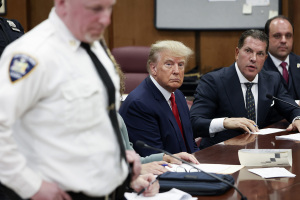Political Party Analysis: Republican 'Whites Only' Strategy Is Recipe for Disaster; Try This Instead (Part 3)

The future of the Republican Party looks bleak. With the proportion of non-white voters increasing, demography is working against them. Republicans need an agenda that demonstrates their trust of voters — an agenda that looks to expand, rather than simply mobilize, its base. To do this, Republicans need to show potential supporters that they want them in the voting booth.
Part one of this series pointed out that some Republicans have advocated a "whites only" strategy for winning elections, and explained why that strategy would be disastrous for the party and for the nation. (Part two advised Democrats on what to do about their religion problem.)
Instead of a "whites only" strategy, Republicans should seek to expand their base. They can do this with an "expand democracy" platform.
In many ways, some subtle, others not so subtle, Republicans have been sending messages that they do not want to expand voting. Some Republicans have even opposed National Science Foundation funds for the one academic discipline that conducts the most research on voting and democratic institutions — political science. Republicans cannot expand their base if they are sending a message to certain voters that they do not even want them to vote.
This has not always been the case. In the late 1970's and early 1980's, Republicans expanded their base by reaching out to Evangelicals and encouraging them to vote. It was a risky strategy. Evangelicals did not vote in high numbers and mostly voted for Democrats when they did. Additionally, after the Civil War, the Republican Party championed the 15th Amendment, which gave voting rights to former slaves. Blacks were loyal Republican voters for a century after that.
Mobilizing voters based upon racism, on the other hand, has not gone well for Republicans. In the 1960's, Republicans embraced a "Southern Strategy" in which they reached out to white Southern Democrats with a "states rights" argument designed to allow them to continue disenfranchising blacks and excluding blacks from public accomodations.
The strategy worked in the short term by helping move the South from strong Democratic territory to strong Republican territory. In the long term, however, the strategy was a disaster. Fifty years later, many non-whites, especially blacks, remain deeply suspicious of the Republican Party because of their embrace of racist sentiments.
To expunge its racist past, Republicans need a proactive platform that demonstrates to non-whites that they are on their side.
This "expand democracy" platform has six parts:
1. Don't Use Voter ID Laws to Hurt Voters
On the election reform front, Republicans have mostly focused on one issue — voter ID. This is not a bad issue for Republicans. Polls show that strong majorities support requiring voters to have a government-issued ID card. The way some Republicans have tried to implement voter ID requirements, however, appear more aimed at keeping certain voters away from the voting booth than preventing election fraud.
Republicans in Pennsylvania, for instance, passed a voter ID law in March of 2012 that they tried to put into effect in less than seven months. This left little time for voters and election commissioners to prepare for the change. In June of that year, Republican House Majority Leader Mike Turzai made some comments at a state Republican committee meeting that suggested the law was passed more to help Republicans rather than protect the integrity of elections.
"Voter ID," he said, "... is gonna allow [Republican presidential nominee] Governor [Mitt] Romney to win the state of Pennsylvania."
A judge delayed that law from going into effect before the 2012 election, and in June a state judge struck down the law entirely, arguing it placed an "unreasonable burden" on voting.
As Republicans move forward with voter ID laws, they need to do so in a way that does not harm voters. Rushing a law into effect in order to give your party an advantage is not the way to do that.
Besides providing plenty of time for implementation, Republicans need to make sure that acquiring an ID is easy. In Georgia, for instance, voter ID's are free for anyone who does not already have a state-issued ID and can be obtained at the same place one registers to vote or gets a driver's license.
2. Election Reform
Some Republicans have seemed more interested in rigging the system, rather than appealing to voters, to help them win.
In Wisconsin, for instance, Republicans passed a law that eliminates early voting on the weekends. Since most of those who have to work on the weekends are low wage workers, and low wage workers are more likely to vote Democrat, it is not difficult to figure out the electoral calculations involved in the decision.
There are some legitimate reasons to oppose early voting. (Candidates should have until election day to make their case, for instance). But only partly limiting early voting in a way that hurts particular voters is not the way Republicans should do that. Republicans should show they are for, not against, voting.
In another scheme, this time unsuccessful, Republican strategists in several states sought to apportion electoral college votes by congressional district after the 2012 election. Here again, there are some legitimate reasons to reform the electoral college, but in this instance they only wanted to institute the reform in the states that would help them win a presidential race. The motivation was not to improve Democracy, it was to rig the system.
Alternatively, Republicans can show that they are on voter's sides by simply improving voting. During the 2012 election, 12 years after the Bush vs. Gore election that spotlighted numerous problems with the U.S. election system, there were still a large number of voting irregularities (many in Florida, again).
By leading on the issue of election reform, Republican politicians can show voters they are on their side.
3. Puerto Rico Statehood
Puerto Rico residents are U.S. citizens but do not have the full rights and responsibilities of citizenship because Puerto Rico is not a state. In January 2013, a group of conservatives called on Republicans to support allowing Puerto Rico to become the 51st state. In an interview with The Christian Post at the time, Alfonso Aguilar, executive director of the Latino Partnership for Conservative Principles, noted that America was founded because England did not recognize the natural rights of its citizens.




























